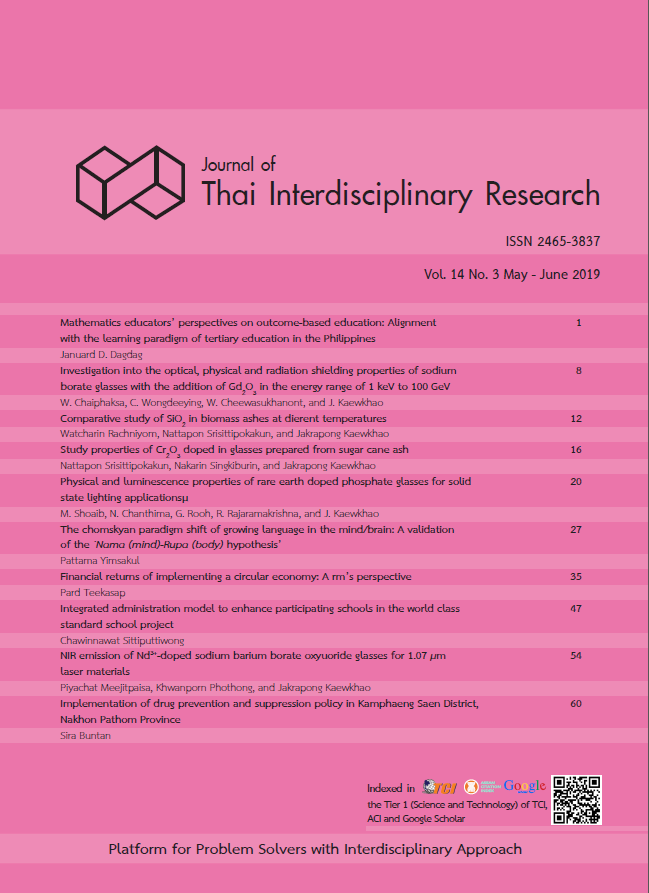Implementation of drug prevention and suppression policy in Kamphaeng Saen District, Nakhon Pathom Province
Main Article Content
Abstract
The objectives of this study were to study: 1) the drug situation in Kamphaeng Saen District, Nakhon Pathom Province; 2) the social structural context aecting the implementation of the drug prevention and suppression policy in the area; and 3) the factors aecting the success or failure of the drug prevention and suppression policy. A qualitative research methodology was used for this study. Data from an in-depth interview was analyzed. Questions were asked that were based on the research framework and this was validated by informants. The results showed that the drug situation in the area was likely to get worse. The most widely used drug was methamphetamine. Most of the drug traders were retailers and most of the drug users were laborers. Additional findings related to social and structural context that aect the implementation of drug prevention and suppression policy. These were found to relate to issues relating to globalization, the cultural context, economic problems and political instability. The drugs that were being used in the area were found to come from neighboring countries. It was felt that these countries did not pay sucient attention to drug prevention and suppression. The implementation of drug policy in Kamphaeng Saen was found to be more dicult as a result of globalization. It was found that the patronage culture and family relationships present in Kamphaeng Saen resulted in concealment and connivance of drug trackers and users. It was found that the economic downturn caused by a recent slump in agricultural product prices would cause more people turn to drug tracking as a source of income. These economic issues were seen to also have an eect on state ocers making them more inclined to accept corrupt payments. It was found that drug dealers would take advantage of political instability to increase their drug tracking activities. The factors which aected the success of drug prevention and suppression policy in the area of the study were found to be related to policy, organization, participation and motivation. The policy of drug prevention and suppression was found to be fair and clear. However, the operations on the ground were found to not respond to the specific problems in the area. The Chief District Ocer, as the Director of Narcotics Suppression Operation Center, was found to be organized and competent; however, the district lacked sucient resources to fully implement the drug prevention and suppression policy. It was found that public participation was insucient and that the ocers responsible for implementing the policy were lacking in motivation.
Article Details
References
Office of Narcotics control Board, Report on implementation of Public-Private Partnership (PPP) scheme for drug prevention year 2017, Bangkok (2018) 3.
District Office, Summary of kamphaeng saen district, Nakhon pathom, Kamphaeng saen district Office (2017) 1-2.
C. Praditsil, A political economic model of policy implementation, Burapa journal of political economy 2 (2013) 1-27.
S. Thamrongthanyawong, Public policy thinking concept, Analysis and procedure, Bangkok Sematham Publishing (2011).
V. Meter, V. Horn, The policy implementation process a conceptual framewor, Administration and Society 6 (1975) 445-487.
D. P. Mazmanian Sabatier The implementation of public policy A Framework of analysis, Policy Studies Journal 8 (1980) 538-560.
J. A. Pressman Wilddavsky Implementation, California University of California press (1984).
K. Tongkow The analysis of factors affecting the success of public policy implementation a case study of national literacy campaign, Doctoral dissertation, Graduate School of Public administration. National institute of Development administration (1991).
W. Chandarasorn, An integrated theory of public policy implementation, Bangkok Thai University Research Association (TURA) (2005) 181-196.
T. Sudcharee, The teachers college policy implementation a case study of the United college of Southern isarn, Doctoral Dissertation, Graduate school of Public Administration, National Institute of Development Administration (1991).
V. Meter, V. Horn, The implementation of intergovernmental policy, California Sage Publications Inc (1976).
G. Edward, Implementing public policy, Washington D.C. Congressional Quarterly Press (1980).
G. Cheema, D. Rondinelli, Implementation Decentralization Programmes in Asia Local capacity for Rural development, Nagoya united nations center for Regional development (1983).
S. Makchuay, Factors impinging upon the success of Narcotics Suppression Bureau in implementing narcotics resolution policy, EAU heritage journal social science and Humanity 5(2015) 176-187.
T. Khotsing, The Community title deed policy implementation, Master thesis, (Social Development) , Graduate School of Social and Environmental development, National institute of Development administration (2013).


